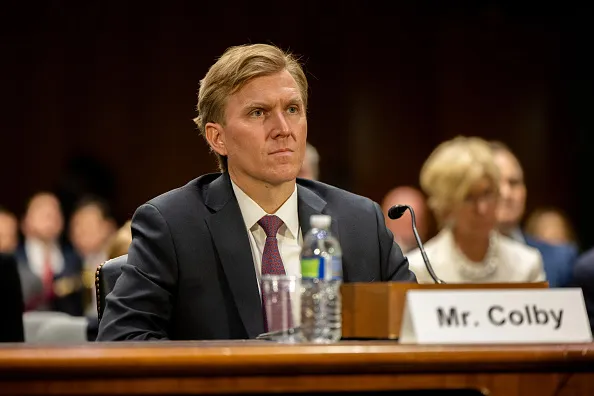How Elbridge Colby’s rise marks the shift from allied reassurance to strategic triage—and why Congress is suddenly noticing.
Washington loves its consensus candidates—officials who speak in acronym, offend no one, and leave policy exactly where they found it. Elbridge Colby is not that man.
The new Under Secretary of Defense for Policy, confirmed in April 2025 after a bruising 54–45 vote, has built his career on a single, uncompromising idea: the United States cannot defend everything, everywhere. In an era of stretched budgets and mounting threats, it must focus—first, last, and always—on China.
Colby’s elevation from think-tank theorist to Pentagon power broker signals a deliberate break with the “forever alliances” model that defined U.S. grand strategy since the Cold War. His approach blends hard-nosed realism with a willingness to offend traditional allies, Congress, and even parts of his own party.
From Theory to Command
A Harvard and Yale product with a résumé equal parts policy paper and war plan, Colby co-founded The Marathon Initiative and authored The Strategy of Denial, a 2021 blueprint for deterring China through regional coalitions backed by American firepower.
As Deputy Assistant Secretary of Defense for Strategy and Force Development during the first Trump administration, he helped craft the 2018 National Defense Strategy—the document that shifted the Pentagon’s vocabulary from “counter-terrorism” to “great-power competition.”
When he returned to government in 2025 as the Pentagon’s top strategist, he brought that same clarity—and the same impatience for anything that diluted it.
The Colby Priorities
Colby’s worldview runs on triage. Europe’s wars, Middle Eastern intrigues, even humanitarian missions—all secondary. What matters is the Western Pacific: keeping China from seizing Taiwan and dominating Asia’s first island chain.
That laser focus has led him to:
- Review the AUKUS Pact. Colby ordered an internal audit of the submarine and technology agreement among the U.S., U.K., and Australia to ensure it “aligns with an America-First agenda.” The move rattled Canberra and London, both of whom expected continuity rather than conditionality.
- Press allies on spending. In July 2025 he declared that Washington “will not be deterred” from demanding higher defense budgets from partners, an unsubtle warning to Europe and the Pacific alike that free-riding is over.
- De-prioritize the Middle East. He has argued publicly that every battalion tied up in the Gulf is one less available for deterrence in Asia—a line that irks traditional hawks but pleases budget hawks.
To admirers, this is refreshing realism: focus resources where the fight will be hardest. To critics, it looks like the U.S. edging toward strategic isolationism just as adversaries sense opportunity.
Confirmation Without Consensus
Colby’s nomination exposed fault lines on the right. Realists and “restrainers” saw him as the antidote to neocon overreach; interventionists warned he would hollow out U.S. commitments abroad. Tablet Magazine chronicled the knife-fight among conservatives: the Bush-era internationalists versus a new generation of “post-global” strategists.
The Senate ultimately confirmed him, but the near-party-line vote foreshadowed the confrontations now erupting between Colby’s office and Congress.
The Senate Pushback
In early November 2025, multiple senators from both parties publicly accused Colby’s policy directorate of stonewalling oversight. Senator Dan Sullivan (R-AK) complained, “Man, I can’t even get a response, and we’re on your team.” Armed Services Committee Chair Roger Wicker (R-MS) said members had “struggled to receive information” or “consult in a meaningful way” on major policy shifts such as the Romania drawdown and Indo-Pacific deployments.
Reporters at Breaking Defense and Reuters described the atmosphere as “tense” and “Pigpen-like”—a swirl of dust and paperwork with few answers emerging. The Pentagon formally denied shutting anyone out, but the optics were clear: a Congress that writes the checks feels it’s no longer in the loop.
This is not a procedural spat; it’s a philosophical one. Colby’s ethos prizes speed, discretion, and unity of effort. Congress’s ethos prizes visibility and veto points. In a world moving faster than committee calendars, he appears to have chosen velocity over permission.
Friction as a Feature
From a systems perspective, Colby is testing the limits of bureaucratic adaptability. The Department of Defense has long been optimized for continuity, not disruption. By compressing decision cycles and narrowing strategic bandwidth, Colby is effectively forcing an organization designed for infinite commitments to pick its battles.
That process looks messy—especially to senators who equate briefings with control—but it may be the only way to reconcile finite means with global obligations. In Deming terms, he’s identifying the variance no one wants to measure: how much strategic waste the U.S. can no longer afford.
Allies in the Crosshairs
The collateral damage is diplomatic. Australian and British officials privately express concern that Washington’s internal reviews could undercut AUKUS just as shipyards and contractors ramp up. In Europe, defense ministers quietly note that being “pushed to spend more” sounds less like partnership and more like protection money.
Yet even they concede the underlying math: the United States cannot sustain Cold War-era commitments with 21st-century budgets. Colby’s bluntness simply states what spreadsheets already know.
A New Kind of Hawk
Unlike the ideologues of past decades, Colby is not selling crusades. His realism is almost clinical: deter China decisively, hold Russia at bay with minimal outlay, and avoid wars of conscience. He believes strategy should be empirical, not emotional—a doctrine that appeals to engineers and unnerves politicians.
The cost is perception. To Congress, he looks secretive. To allies, transactional. To bureaucrats, disruptive. But to the logic of limited power, he may be inevitable.
The Post-Consensus Pentagon
Whether Elbridge Colby’s tenure becomes a case study in disciplined prioritization or a cautionary tale of over-correction will depend on outcomes measured years from now. For now, he has done what few defense policymakers manage: make strategy controversial again.
The old consensus—that American leadership required endless promises—has collapsed under its own arithmetic. Colby’s experiment is to see if realism can replace it without collapsing the order it built.
If nothing else, he’s proving that in a multipolar world, even Washington has to learn to multitask less.
Citations
- Reuters – “Pentagon denies Republican accusations it is shutting them out” (Nov 5 2025)
- Breaking Defense – “Republican senators accuse Pentagon policy shop of stonewalling Congress” (Nov 4 2025)
- The Nightly – “AUKUS review: Pentagon’s Elbridge Colby orders inquiry to ensure defense pact aligns with America First agenda” (Oct 2025)
- News.com.au – “US defense official Elbridge Colby demands allies boost defense spending” (July 2025)
- Tablet Magazine – “Elbridge Colby and the New Right Foreign Policy Debate” (Feb 2025)
- Congress.gov – “Nomination of Elbridge A. Colby” (Apr 8 2025)
- Defense.gov – “Biography: Elbridge A. Colby”
- CSIS – “Great Power Competition in Latin America: SOUTHCOM’s Strategic Outlook” (2025)

